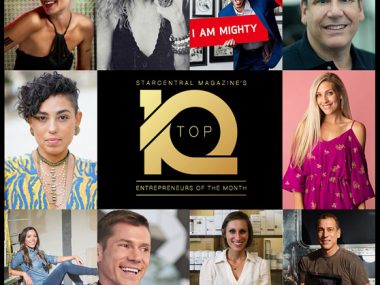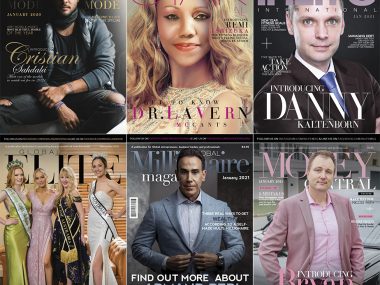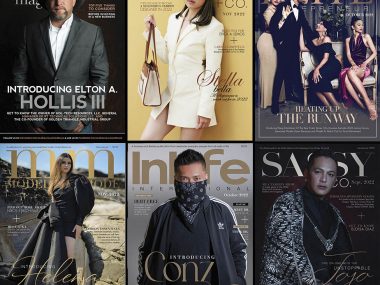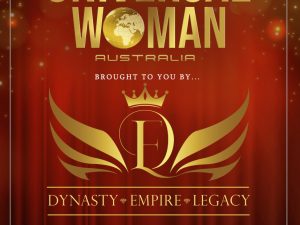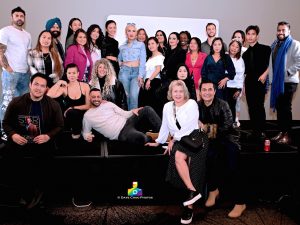Ayo Adepoju is the founder and managing director of London-based music PR and media company “We Plug Good Music.”
In the music PR space, they work with mostly new and emerging artists and have been able to get their clients featured and supported by the likes of Billboard, Complex, The FADER, Interview Magazine Afropunk, Okayplayer, and others. Some of their previous PR clients include Platoon, Island Records, First Access Entertainment, and Sony/RCA.
As a media company, their music and culture outlets (WePlugGoodMusic.com and ConversationsAboutHer.net) average over 100K monthly visits with their social media following also surpassing 120K across Facebook, Twitter, Instagram, and YouTube.
They’ve won the UK BEFFTA Award for UK Blog of the Year in 2012, CA Award for Best Publicist/PR in 2015 and 2019, the Young Music Boss Award Winner for Publicist of the Year in 2017, and the African Pride Award Winner for Media & PR Agency of the Year in 2017 as well.
StarCentral Magazine recently caught up with Ayo to discuss his journey to entrepreneurship and here’s what went down:
Could you please tell our readers a brief background about yourself and how you started your business?
My name is Ayo Adepoju, I’m the founder of We Plug Good Music, a London-based music PR, and media company that believes in the power of good music.
Starting as a music blog in 2009 before launching its music PR and publicity company in 2012, We Plug Good Music is an innovation borne out of our passion for the best new and emerging music. Our goal is to revolutionize and democratize the way new music is discovered and consumed to favour new and emerging artists.
We Plug Good Music provides a relevant platform, via digital PR and publicity, media and publishing, and live events, to promote and raise awareness for the best new music and artists that mainstream spaces often overlook.
When did your entrepreneurial flair first reveal itself?
If I’m being honest, I would say being an entrepreneur was thrust upon me in a sense because I had always grown up with the somewhat imbalanced notion that you couldn’t make a living as a creative so instead of pursuing my initial passions for music and writing, I went down the route of trying to get into the investment banking industry.
I studied business at university and international finance for my Master’s Degree, but during my Master’s Degree program, I started a music blog called We Plug Good Music, it was a platform for me to share some of my favourite new artists and their music that nobody else was highlighting, but it was also my passions for music and writing to find their outlets.
What started as a music blog quickly grew a life of its own and turned into two online publications, a live concert series, an online radio show, and now a music PR company.
Running all of those early endeavours definitely brought out my entrepreneurial spirit for sure, but these were still very much passion projects and hobbies because I still wanted to land a job in investment banking.
However, none of my job applications were panning out, so I thought I’d go back to school to get my CFA (Chartered Financial Analyst) qualifications to boost my CV, but while I was doing that, I lost my retail job, which was funding all my We Plug Good Music projects at the time.
So here I was, back in school, with no source of income but I had all of these creative projects with We Plug Good Music fuelling my passions and literally giving me life…
And then out of nowhere, some of the artists we had been working with across our blogs, radio shows, and live concerts started asking us to provide them with press and publicity services and that’s how our music PR business began.
We were offering press and PR services to artists for free for about six months, which was what you would call our proof of concept. After those months, I prayed to God that I was going to turn this free service I was now offering into a paid service and God made it good – that’s why I say being an entrepreneur was thrust upon me in a sense.
How did your life look like before being an entrepreneur?
As I alluded to above, before launching We Plug Good Music as a business, it was a passion project for a good few years, and in that time, I was firstly studying at Kingston University in London for a Master’s Degree in International Finance, as I wanted a career in investment banking.
While I was studying at Kingston University, I was also working in retail part-time. After finishing my Master’s Degree program, I went full-time at the retail job, while going headlong into applying for investment banking jobs in London, to no success at all.
As an entrepreneur, what is it that motivates and drives you?
What drives me at We Plug Good Music is helping the best new artists get their music heard and their stories told. Seeing the artists that we work with get the kind of credibility, awareness, and visibility that they deserve and being able to help them achieve that is a really great achievement and strong motivator.
On a personal level, being able to do what I love and have a passion for, make a living out of it, and provide for my family and running a business that God has put in my hard to steward keeps me going.
In one word, describe your life as an entrepreneur and explain why.
Right this moment, the one word I would use to describe my life as an entrepreneur is NON-STOP! With the pandemic and lockdown, we’ve not been able to handle working remotely as well as we would have hoped.
Managing a team via zoom calls, emails, WhatsApp messages, and everything in between have proved especially tasking and it especially feels like the amount of people I have to get back to, from staff to clients to contractors, seems endless.
Burnout is something that has been especially prevalent amongst business and career people recently and I relate, but sometimes you feel you just can’t stop. I think we all need a break at some point.
What were your top three motivations for starting your business?
I didn’t start We Plug Good Music as a business, but it evolved into one, so I’ll answer this one slightly differently.
My main motivation for starting We Plug Good Music was to support new and emerging artists and musicians that were too often being overlooked by the mainstream media and mainstream industry, and all of the different facets of We Plug Good Music all point to meeting this need and solving this problem for artists, from our media platforms to our live concert series to our brief online radio platforms and our music PR business.
My motivations for evolving We Plug Good Music into a business were for me to be able to make a living out of doing what I love, what I was passionate about, and what I believed I was good at. I believe God blesses the work of our hands and ultimately, before I leaned into running We Plug Good Music as a business, I took it to God and asked Him to make it good, that was also a motivation for me to move forward with We Plug Good Music as a business.
What would you say are the key elements for starting and running a successful business?
I believe a very key element is for your business to actually be solving a problem. Is your product or service solving a problem and are you adding value?
Another key element for me is making sure people know about your problem-solving and value-adding product or service because as GaryVee once said, the best product or service will always win ONLY if people know about it. The other elements that come to mind would be Good leadership, humility, and the ability to delegate.
What are the three biggest challenges you have faced growing the business and how did you overcome them?
One of our biggest challenges is the question of how to scale the business, and to be honest, it’s still one that we’re trying to figure out. For me, the two ways to scale are either by increasing the number of clients we work with per month or by increasing the amount of money we charge our clients per month.
The challenge with the first way is bandwidth and personnel – we want to ensure we can deliver the same 100% level of service to all our clients and if we can’t do that at our current capacity, it means bringing in new staff to increase capacity but you always to bring in the best talent so that you know the level of service to your clients is not going to falter in any way. At the same time, you have to consider the responsibility of bringing in additional staff, based on the business’ cash flow. It can feel like a difficult balancing act sometimes.
The challenge with the second way, for us personally, is that the reason we started the business in the first place was to support new and emerging artists and musicians that are not getting the mainstream attention they deserve, and more times, new, emerging, and/or unsigned artists don’t have the biggest budgets, and increasing how much we charge our clients might price out the very people we started the business to support in the first place. This also can feel like a difficult balancing act.
Where we have found how to overcome these challenges is by combining these two ways to scale the business in a way that our current bandwidth and personnel can manage, but also in a way that we don’t price out the people we are here to serve.
What form of marketing has worked well for your business throughout the years?
At the beginning of our business, the forms of marketing that worked for us were the word of mouth and one-to-one email marketing, and nine years later, these are still our strongest forms of marketing.
Much of our business continues to come from referrals from previous clients, and word of mouth, as well as us, pitching directly to the artists and musicians that we believe we can add value to through 1:1 mail marketing.
Another form of marketing that works well for our business is content marketing and branding, we share the campaigns we are working on across our social media channels and that builds our brand within the music PR space and keeps us in the minds of artists and their teams for when they might need music PR.
Lastly, we have been leaning into paid advertising, specifically Facebook and Instagram lead generation advertising, over the past two years, and that has had a good outcome by and large.
As you grew the business, what have been some of the most important leadership lessons you have learned?
One of the most important leadership lessons I have learned is that great leadership is all about service — service to your family, service to your community, service to your clients, service to your organization, and service to society.
Some of the people that have taught me this lesson are GaryVee, Craig Groeschel of Life Church in Texas, and Joseph Nwani of Jesus House in London, just by how they as leaders serve the people around them selflessly.
Another leadership lesson I have learned is about expectations, in the sense that, as a leader and/or business owner, I shouldn’t expect my staff or anybody else to care about this business even remotely close to how I care about it.
What motivates me in this business as its owner is not what motivates my team, I have to find what motivates them and tap into that for them, instead of expecting them to be motivated by what motivates me, or to care about the things I care about.
What is the best advice you have ever been given?
1. Nobody cares, work harder — this speaks to how your deliverables are YOUR deliverables and if you have agreed to do something or deliver something, save the excuses, just get the job done.
It is nobody else’s responsibility to worry about mitigating factors or extenuating circumstances, you are the head of the business and the buck stops with you, so don’t bring excuses to the table.
2. The best product will always win ONLY if people know about it — this has taught me not to be shy or hesitant about shouting about our wins and victories, and about what we are doing well.
3. Psalm 37:5, which says, “Commit everything you do to the LORD. Trust him, and he will help you” — reminds me to always put my trust in God no matter the situation, and to commit all my moves to Him.
What advice would you give to a newbie Entrepreneur setting up their first business?
I would say ‘Nobody cares, work harder for the reasons I mentioned just above, but more importantly if you have a product or service that is meeting a need, solving a problem, or adding value in some way, then keep going, and remember to go again, no matter what happens today, get some rest and show up tomorrow and go again. I say it like this to myself and my team, “we go again” and it helps to keep me going.





